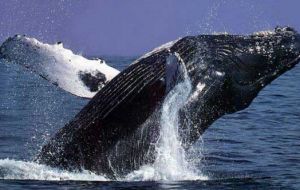MercoPress. South Atlantic News Agency
NZ support for South Chile's blue whales controversy
 The Gulf of Corcovado is home to about 200 migrating blue whales
The Gulf of Corcovado is home to about 200 migrating blue whales The New Zealand Residence House hosted a send-off Wednesday for a Chilean delegation heading to New Zealand to study the country's protection and management of marine resources.
The delegation leaves just a week after Chile's National Commission of Coastal Use voted to delay a proposal to establish a Protected Marine Coastal Area (AMCP) in the Gulf of Corcovado in southern Chile for blue whales. The departing group is made up of 18 delegates representing varying interests, ranging from conservation to tourism and indigenous groups to artisan fisherman. The 11-day trip, largely funded by the Government of New Zealand, will focus on multi-use marine conservation - the protection of marine habitats in places with diverse stake-holders. The group will also focus their studies on New Zealand's system of Protected Marine Coastal Areas. Many of the delegation's members have been directly involved in the conflict over Corcovado. Additionally, the group includes local authorities from Melinka and Quellón, leaders of the artisan fishermen communities of Region X and XI, and representatives of indigenous groups from Chiloé. The Gulf of Corcovado is home to about 200 migrating blue whales. A current proposal seeks to declare 51,000 km of marine zone, in between the Chiloé and the Guaitecas Archipelagos of Regions X and XI, a protected area. The delay on the establishment of the AMCP in Corcovado, which has been in the works for the past five years, came after artisan fishermen communities complained of a lack of information regarding the details of management of the area, the extent of protection and how it would affect their interests. "For example," said Cosme Caracciolo, President of the National Confederation of Artisan Fisherman in Chile (CONAPACH) "we are in the process of applying for rights to management areas that have not been granted yet simply because of the length of the application process. And what would happen if this (area protection) is approved and our applications are still in process? If a fisherman wants to start a farm, would he be able to? We do not have this type of information, or a concept of the actual reach of this proposal." According to Ernesto Escobar of the Burson-Marsteller public relations firm, before the National Commission of Coastal Use delayed the proposal, most of the responsibility of educating local communities about the effects of the AMCP had fallen in the hands of small conservation organizations. "It is good news that the government wants to give more attention to these communities," Escobar told Santiago Times, "it is a national process, not only the work of small NGOs or international conservation organizations." Among the activities organized by New Zealand's Department of Conservation (DOC) are an official welcome from the Minister of Conservation, Hon. Chris Carter, and a visit to Kaikoura. The protected area of Kaikura in New Zealand is just as important for the survival of marine species like the sperm whale - managed by the local Maori indigenous groups - as for the tourist business thriving there. It is this kind of example of multi-use protected areas that the delegation hopes to study and imitate in Corcovado. Erick Vargas, National Secretary for CONAPACH and President of the Regional Board of Artisan Fisherman (COREPA), is among the delegates. He told Santiago Times he was particularly interested in observing the role of the moari in the management of New Zealand's AMCP. Recent archaeological findings in Chile have confirmed a link between Polynesian indigenous groups and indigenous groups in Chile. For Vargas, a chance to visit New Zealand and its Maori is also a trip of "self-discovery". The group is scheduled to visit a traditional Maori marae, and be received with a formal Powhiri welcome ceremony. The Santiago Times




Top Comments
Disclaimer & comment rulesCommenting for this story is now closed.
If you have a Facebook account, become a fan and comment on our Facebook Page!